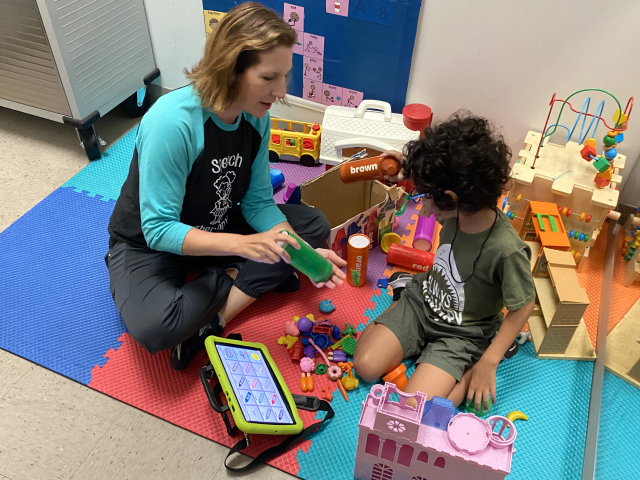Understanding Children's Mental Health
 Easter Seals Greater Houston proudly provides mental health services to veterans and their families, and, thanks to a generous grant from The Powell Foundation, we're also able to provide mental health services for babies with disabilities and their families through the Early Childhood Development (ECI) Program.*
Easter Seals Greater Houston proudly provides mental health services to veterans and their families, and, thanks to a generous grant from The Powell Foundation, we're also able to provide mental health services for babies with disabilities and their families through the Early Childhood Development (ECI) Program.*
Shannon Guinther, LCSW, a Mental Health Clinician with ESGH's Veterans team, shares how mental health services for children differ from services for adults, the array of situations that may lead a child to therapy and what healing can look like for families.
Q: What would you say are the primary differences between mental health care for children and for adults?
Shannon Guinther: Children process information differently from adults given their brain development and reasoning abilities. A clinician cannot expect children to verbalize intense emotions that they probably don’t understand. Children need a different therapeutic approach. Play therapy is the most evidenced-based treatment for helping children work through their issues and learn coping skills to handle “big feelings.”
Q: What do you emphasize for keeping a counseling office child-friendly?
Shannon Guinther: The most effective way to deliver play therapy is in-person in a “playroom.” The room is set up selecting furniture, decorations, toys and games intentionally. It must be a welcoming space for children where they can touch and explore with few limitations. I’ve gotten on my knees when setting up a playroom to see what children will see or notice when they enter the play space. It’s important for children to feel like they have a sense of control over their environment. There are very few things children can control in their day to day life.
Q: What specific issues/illnesses do you most commonly see in your practice?
Shannon Guinther: The most common reason parents refer their children for therapy is because they’re exhibiting distressing behaviors. There can be many reasons why children act out (which may look like tantrums, meltdowns or defiance). Parents often need some psychoeducation about why children behave the way they do and what behaviors are to be expected given the developmental stage of the child. Clinicians teach children how to regulate their emotions in the playroom. They also teach parents how to manage challenging behaviors when they are at home. Some problems that can cause emotional dysregulation may be linked to domestic violence, divorce, trauma or parents suffering from trauma.
Q: What is the most rewarding part of your job? Can you share a memorable experience or two?
Shannon Guinther: The most rewarding part of my job is that I am allowed to be a part of the process helping parents and children build functional, happy relationships where there was anger, confusion and frustration before. Seeing children smile always warms my heart, however glancing at the parents’ genuine smiles as they look at their children is the icing on the cake. I get a kick out of it when children tell me how they handled a distressing situation, not realizing that it’s a skill we’ve been working on in therapy for months. It is so powerful when children own their newer, healthier coping skills.
Helping heal children and families is not done in a vacuum. There are many talented clinicians who take part in the process (play therapy, couples counseling, individual therapy, family therapy). The goal is to assist, not to get accolades. However, once in a while parents share things that remind me why I love my job.
Recently, a mother shared a moment when she watched, teary eyed, as her family interacted. Her husband asked if she was okay. She told him how proud and grateful she was to witness the strides they’ve made. He has PTSD and has worked incredibly hard to use a softer tone of voice and calmer demeanor to regain their daughter’s trust and build their bond. Mom told me she knew their family was going to be okay as they keep working hard and growing together.
- Katherine Swarts, BridgingApps, Digital Content Writer, Easter Seals Greater Houston
Shannon Guinther, LCSW, Veterans, Mental Health Clinician, Easter Seals Greater Houston
*We are currently ONLY able to provide mental health services to veterans, their families and ECI clients.
Special Thanks to The Powell Foundation and Mac DeLaup for the seed money grants that allow us to provide free individual, family, and group counseling to our clients.
